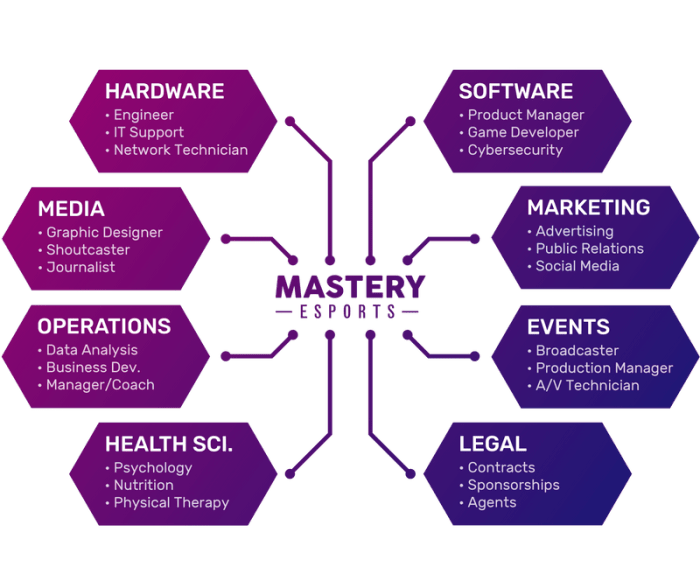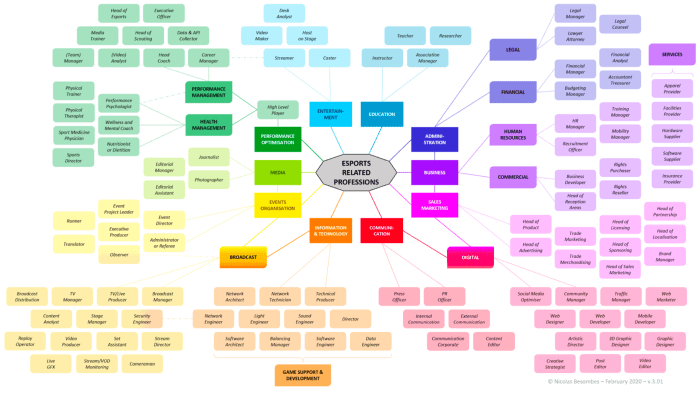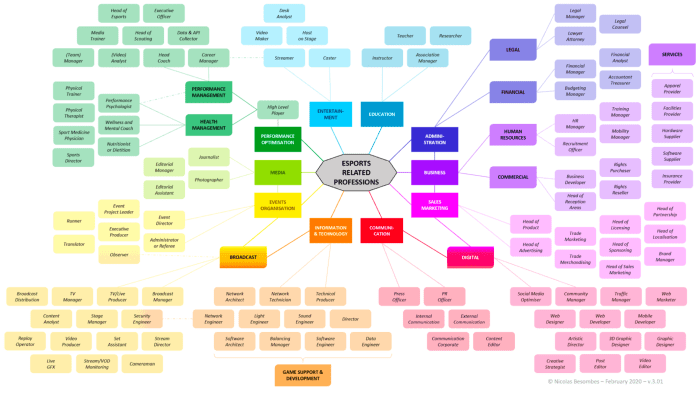Esports Careers are exploding! Forget dusty textbooks – this is a high-octane industry brimming with opportunities beyond just pro-gaming. From coaching and broadcasting to event management and game design, there’s a whole universe of roles for passionate individuals to explore. This isn’t just about clicking buttons; it’s about strategy, teamwork, and building a career in a rapidly evolving global phenomenon.
This guide dives into the diverse career paths within esports, examining the skills needed, the potential salaries, and the challenges you might face. We’ll cover everything from the life of a professional player to the behind-the-scenes roles that make esports events possible, giving you a comprehensive overview of this exciting field.
Esports Event Management and Organization

So, you wanna run an esports tournament? It’s way more than just setting up some PCs and yelling “GO!” It’s a massive undertaking involving logistics, marketing, and a whole lot of caffeine. This section breaks down what it takes to manage an esports event, from small-scale scrambles to massive, stadium-filling spectacles.
Esports event organizers are the unsung heroes behind the hype. They’re the masterminds coordinating everything from securing venues and sponsorships to managing player registrations and broadcasting the event. Think of them as the conductors of a complex orchestra, ensuring every instrument (player, sponsor, staff member) plays in harmony to create an unforgettable experience.
Responsibilities of an Esports Event Organizer
The role of an esports event organizer is multifaceted and demanding. Key responsibilities include securing a venue, managing the budget, recruiting and managing staff (including commentators, referees, and technical support), coordinating marketing and promotion, handling player registration and logistics (travel, accommodation), negotiating sponsorships, overseeing the technical setup (streaming, computers, internet connectivity), managing the tournament rules and regulations, and resolving any disputes that may arise during the event.
They also need strong communication skills to keep all stakeholders informed and engaged throughout the process.
Logistics of Planning and Executing a Large-Scale Esports Tournament, Esports Careers
Planning a large-scale esports tournament is a monumental task. It requires meticulous planning and coordination across multiple departments. Logistics include securing a large venue capable of accommodating thousands of spectators and players, negotiating contracts with sponsors, coordinating travel and accommodation for players and staff from around the world, setting up a complex technical infrastructure to ensure smooth streaming and gameplay, implementing robust security measures to protect players and equipment, and managing a large team of staff to handle various aspects of the event.
The scope and complexity are significantly larger than smaller events, requiring a much larger budget and team. For example, a large tournament like The International (Dota 2) requires months of planning and a team of hundreds of people.
Challenges and Opportunities in Managing an Esports Event
Challenges include managing the high expectations of players, sponsors, and spectators, dealing with unexpected technical issues, navigating the complex legal and regulatory landscape, ensuring fair play and resolving disputes, and staying within budget. Opportunities include building a strong brand reputation, generating significant revenue through sponsorships and ticket sales, reaching a large audience through streaming and social media, and creating memorable experiences for both players and spectators.
The growth of esports provides immense opportunities for organizers to build successful and profitable businesses. For instance, successful events can lead to lucrative sponsorship deals and media rights contracts.
Step-by-Step Guide for Organizing a Smaller-Scale Esports Tournament
Organizing a smaller-scale tournament is a great way to gain experience and build a foundation for larger events. Here’s a step-by-step guide:
- Define the Game and Scope: Choose a game and decide on the size of the tournament (number of players, format, etc.).
- Set a Budget and Secure Funding: Determine the costs involved (venue, prizes, equipment, marketing) and find ways to fund the event (entry fees, sponsorships, personal investment).
- Choose a Venue and Date: Select a suitable location and date, considering accessibility, capacity, and potential conflicts.
- Establish Tournament Rules and Regulations: Create clear rules and guidelines for the tournament, including player eligibility, game settings, and dispute resolution.
- Promote the Tournament: Use social media, online forums, and local gaming communities to spread the word about the event.
- Manage Player Registration: Set up a system for players to register and pay entry fees.
- Set Up the Tournament Infrastructure: Arrange for necessary equipment (computers, internet, screens), and ensure smooth gameplay.
- Run the Tournament: Manage the event on the day, ensuring fair play and resolving any issues that arise.
- Post-Event Analysis: Review the event’s success, identify areas for improvement, and gather feedback from players and spectators.
Esports Marketing and Sponsorship: Esports Careers

Esports marketing is a dynamic field that blends traditional marketing principles with the unique characteristics of the esports ecosystem. Successfully attracting sponsors requires a deep understanding of the target audience, the competitive landscape, and the various marketing channels available. Teams and organizations must build strong brands that resonate with fans and demonstrate clear value propositions to potential sponsors.Esports teams and organizations use a variety of strategies to attract sponsors.
These strategies center around showcasing the value a sponsorship provides, focusing on both brand visibility and return on investment (ROI). The key is demonstrating how a partnership can reach a highly engaged and valuable demographic.
Brand Building and Audience Engagement in Esports Marketing
Building a strong brand within esports is crucial for attracting sponsors. This involves crafting a unique identity that resonates with the target audience – often young, tech-savvy, and highly engaged with online content. This brand identity should be consistent across all platforms, from team logos and social media presence to tournament branding and player interactions. Audience engagement is equally vital; fostering a strong community around the team or tournament creates a loyal fanbase that sponsors find attractive.
Regular interaction with fans through social media, streaming platforms, and community events helps build loyalty and strengthens brand perception. Successful engagement translates into higher viewership, greater social media reach, and a more valuable audience for sponsors. For example, a team consistently engaging with its fans on Twitch and Discord, responding to comments and creating interactive content, builds a loyal and active community that is attractive to potential sponsors.
Marketing Channels Used to Reach Esports Audiences
Esports marketing utilizes a diverse range of channels to reach its target audience. Social media platforms like Twitch, YouTube, Twitter, and Instagram are paramount, offering direct engagement with fans and opportunities for targeted advertising. Live streaming events, both online and offline, provide significant brand visibility and opportunities for sponsor integration. Website and mobile applications offer another direct channel for communication and engagement.
Furthermore, collaborations with influencers and streamers within the esports community can expand reach and credibility. Traditional media, while less central, can still play a role in broader brand awareness campaigns. For instance, a team might use a combination of Twitch streams for live interaction, YouTube for highlight reels, and Twitter for quick updates and contests to reach its audience effectively.
Sample Marketing Plan for an Esports Team
This sample plan focuses on a hypothetical Counter-Strike: Global Offensive (CS:GO) team called “Apex Predators.” Team: Apex Predators (CS:GO) Goal: Secure three major sponsors within six months. Target Audience: Young adults (18-35) interested in esports, gaming, and competitive shooters. Marketing Channels:* Twitch: Daily live streams with sponsor integrations (e.g., logo overlays, product placements).
YouTube
Highlight reels, behind-the-scenes content, and sponsor-focused videos.
Regular updates, fan engagement, and contests with sponsor prizes.
Visually appealing content showcasing the team and sponsors.
Website
Team roster, news, and sponsor information. Key Messaging: Highlighting the team’s skill, competitive spirit, and dedication to the game, while emphasizing the value sponsors receive through audience engagement and brand visibility. Sponsor Acquisition Strategy: Direct outreach to relevant companies (gaming hardware, energy drinks, apparel), demonstrating the potential ROI through detailed audience data and engagement metrics. Measurement: Tracking website traffic, social media engagement, viewership numbers, and sponsor-related conversions.This plan demonstrates a multi-channel approach leveraging the strengths of each platform to maximize reach and engagement, ultimately increasing the value proposition for potential sponsors.
The focus on data-driven insights ensures that the team can demonstrate the effectiveness of their marketing efforts and the ROI for sponsors.
FAQ Overview
What’s the average salary for an esports commentator?
It varies wildly based on experience and platform, from a few thousand dollars a year for smaller events to six-figures for top-tier talent on major leagues.
Do I need a college degree for an esports career?
Not necessarily. While a degree can be beneficial, practical experience, a strong portfolio (for roles like game design), and demonstrable skills are often more important.
How competitive is the esports job market?
Incredibly competitive, especially for high-profile roles. Networking, building a strong online presence, and showcasing your skills are crucial for standing out.
What are the downsides of an esports career?
Long hours, intense pressure, potential for burnout, and unpredictable income (especially for players) are common challenges.
